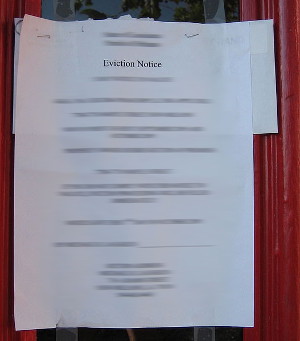A Badly Started Eviction in Massachusetts
| . Posted in advice, evictions - 0 Comments
Last night I spoke with a friend who was served an eviction notice. She asked for my advice and shared her story. It's an incredible story about incredible ineptness. We can all learn from the example. The execution is so badly botched it's probably the least likely eviction in Massachusetts ever.
I won't share the real names, but for simplicity's sake, let's assume it's Tina Tenant and Larry Landlord.
Background Information
Tina's building was sold to Larry in the last few months. Following the purchase, Larry has been busy dealing with all sorts of problems and forgot to tell Tina how to pay her rent. That's mistake number one and number two.
#1: When taking over a building, you should make contact with each resident to tell them how to pay rent. [Not the law, just a good idea.]
#2: When taking over a building, you must within 45 days tell the tenant where their security deposit has been moved to. [The law, otherwise you're liable for triple damages on the deposit.]
On several occasions she actually stopped the rent collector sent to the premises. She said, "Look, we're in this unit, we need to pay our rent." The rent collector said, "I only came here for that unit. I'll check with the office and come back soon."
That's weird, huh?
For several months, Tina had no contact from Larry or his team and nowhere to send a check.
Okay, so how well organized can Larry be if he doesn't know who has paid and who hasn't? That's mistake number three.
#3: You must keep an accurate and timely rent roll. [Not the law, but you can't win in court without it.]
How not to start an Eviction in Massachusetts
Tina found taped to her door a 14 day notice to quit. Stop right there, that's mistake number four.
#4: You can't give notice by taping a piece of paper to a door. You have to mail it or have it delivered in person to the tenant. [The law.]
I asked Tina if she had acknowledged it. She had already called the office about it. I said, "That's too bad, you could have just thrown it away and pretended like you didn't get it."
I asked Tina what kind of rental agreement she had.
"Do you have a lease?" I asked.
"No, we're month to month," she said.
"Do you have a paper agreement?"
"No," she said.
That's mistake number five.
#5: Tenants without paperwork are at sufferance and don't even need a notice before you can begin eviction. But without an agreement, how can a judge enforce your collecting rent? What is the rent? When is it due? They tried to pay? Case dismissed! [The law, together with the judge's interpretation of fairness.]
I looked at the notice.
"Where's your name?" I asked.
"Those are the names of the previous tenants. They moved out and we moved in. Although that person, she's our roommate now. She's still there."
That's mistake number six.
#6: You should know the names of the people living in your units, especially if someone moves out and provides a replacement tenant. [Not the law, just a good idea.]
Tina was wondering what would happen if she just refused to pay rent until they got organized.
I asked her, "What's your apartment like? Do you have any leaks or..."
She interrupted, "Yeah, there's a leak in our closet right now. Our whole building is full of roaches. It's a mess."
I said, "Well, if you really want a knock-down drag-out kind of fight, why don't you call the Board of Health to see if they can make any recommendations?"
That's mistake number seven.
#7: You should not begin eviction proceedings against a well-informed tenant if you're running a slum. [Not the law, just a good idea.]
The Board of Health will come in and compound your problems ten-fold.
Tina called the landlord and explained her frustration to him. They're going to patch things up.
Like I said at the beginning, though, this eviction was a non-starter. It's also a pretty disrespectful way to deal with a tenant who actually wants to cooperate.
Don't be like Larry Landlord.
Click here for our 14 day and 30 day notices to quit.





